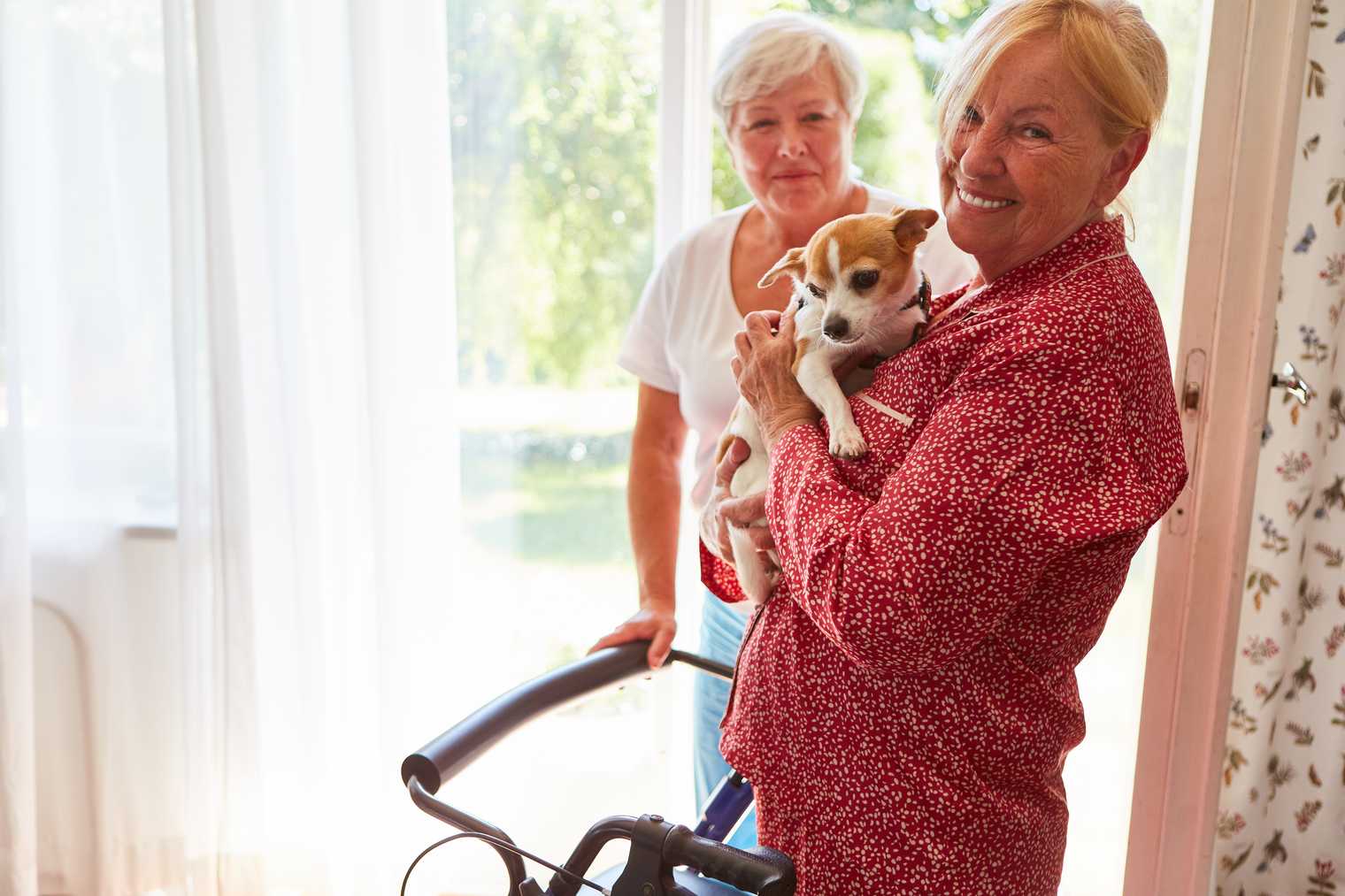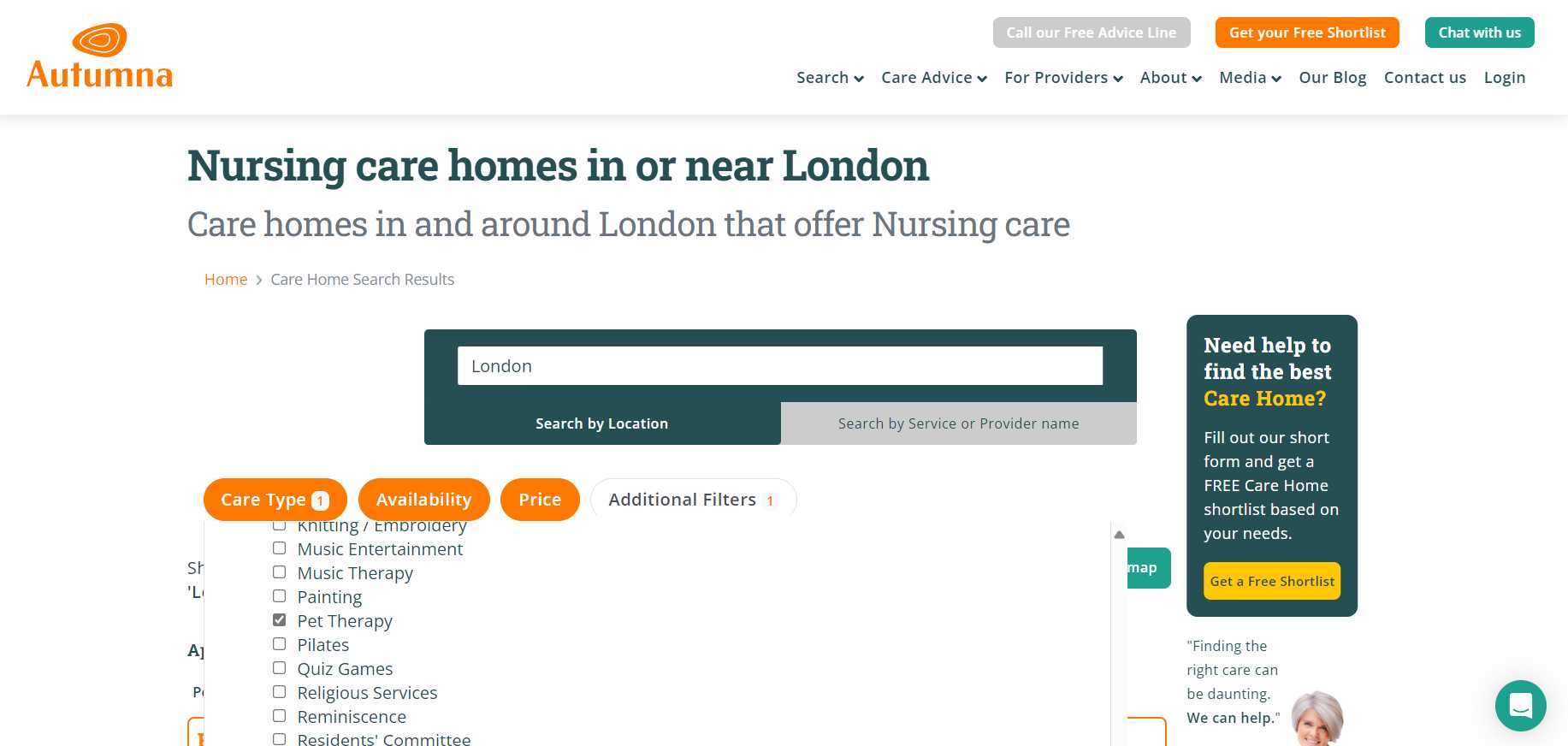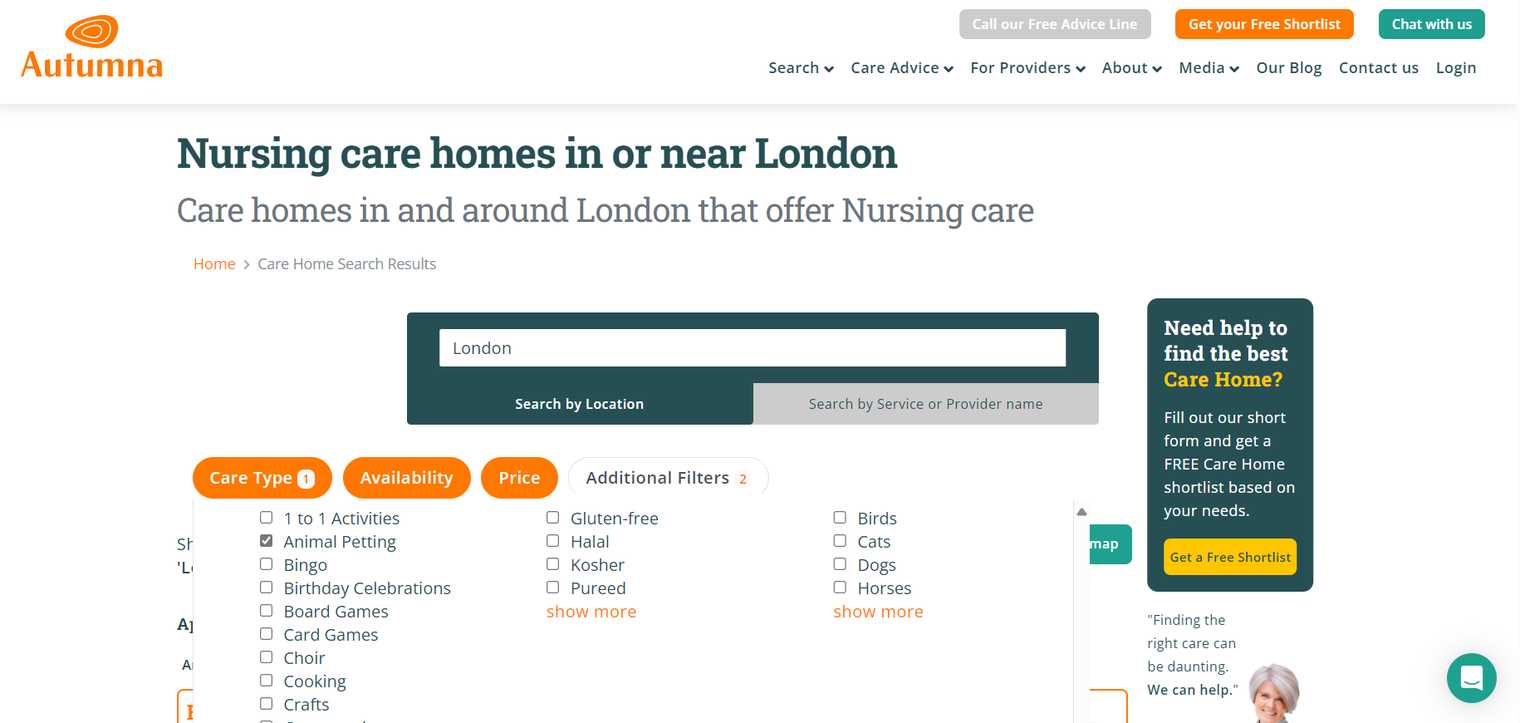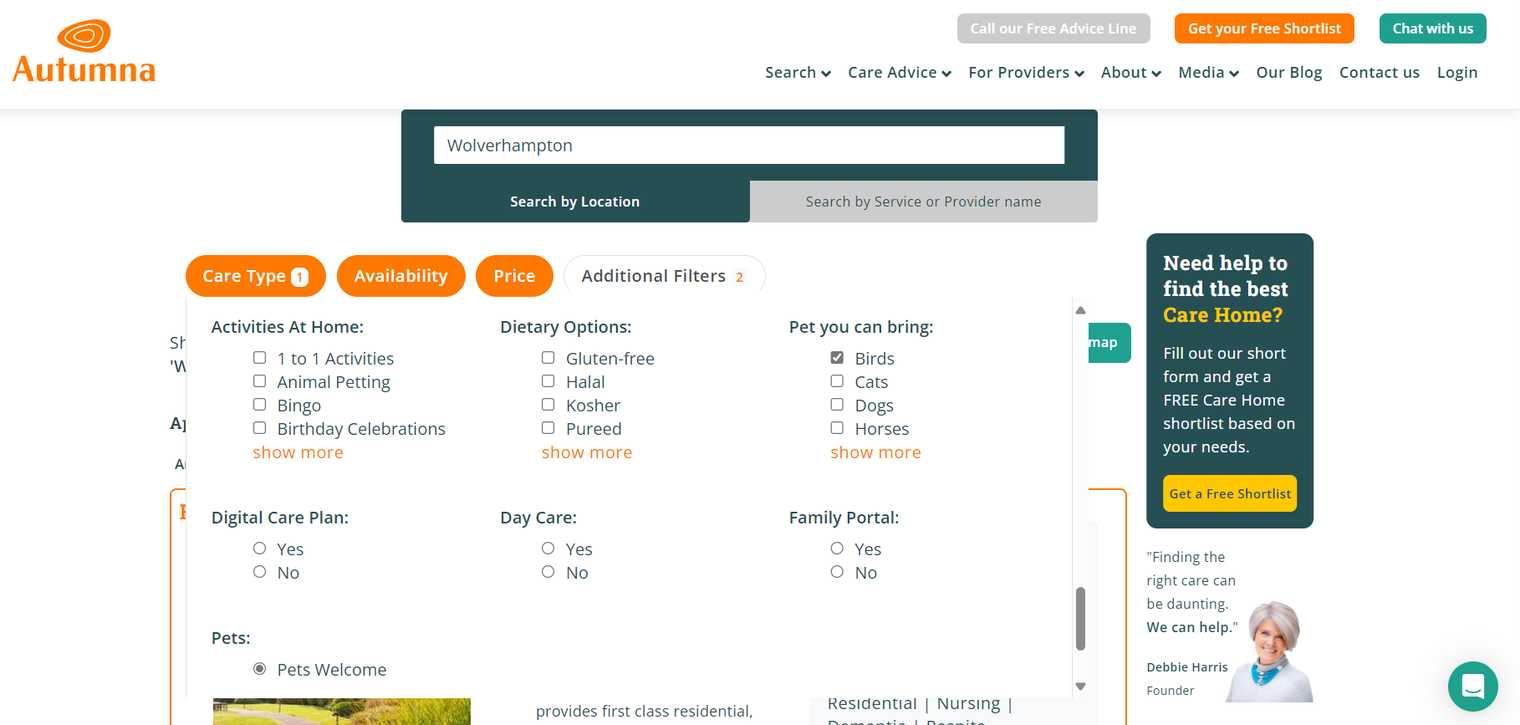Posted by Janine Griffiths
Using Pets as Therapy in Nursing Homes: Key benefits

Using pets as therapy has a long and rich history dating back centuries. Today, many nursing homes continue this tradition by offering pet therapy and arranging regular animal visits to provide comfort and enhance the well-being of their residents.
According to a survey commissioned by the Human Animal Bond Research Institute (HABRI) and Mars Petcare, pet therapy can reduce social isolation, with 85% of elderly people stating that it helped reduce loneliness.
So, while there is some anecdotal evidence that pets can improve wellbeing, how effective is pet therapy in a nursing home setting?
In this blog, we attempt to answer this question by exploring the science behind using pets as therapy in nursing homes.
Definition of pet therapy
Pet therapy (also known as animal assisted therapy) involves using animals to support individuals dealing with mental and physical health issues. These animals offer comfort and can perform specific tasks to assist with a person's condition during times of need. Pet therapy is intended to complement, not substitute, other forms of treatment.
While it is commonly implemented in nursing homes, it is also widely used in hospices, hospitals, rehabilitation centres, and other institutions.
Different types of pet therapy
There are several types of pet therapy that are commonly used in nursing homes and other facilities. These are:
Emotional support animal
Emotional support animals offer significant benefits to individuals experiencing social isolation, loneliness and other forms of distress. These companion animals can provide therapeutic support, unconditional love, and companionship to those in need.
According to a study published in the Psychogeriatrics journal, pet therapy was shown to be effective in improving depressive symptoms and cognitive function in residents of long-term nursing care facilities with mental illness.
Therapeutic visitation animals
These are domesticated pets trained to visit hospitals, nursing homes, rehabilitation centres, and other care facilities, bringing comfort and joy to individuals who are away from home due to physical or mental health issues.
Our directory helps you find nursing homes that uses pets as therapy like Dormy's Bramshott Grange in Guildford, which offers pet therapy and regular animal visits.
Animal-Assisted Therapy for Dementia Patients
In this type of pet therapy, specially trained animals work alongside physical, mental, or occupational therapists to aid patients with specific conditions such as dementia or Alzheimer's. With this type of therapy, animals may be used to support and monitor patients, in addition to providing companionship. In some cases, animals such as dogs may also help with memory training or retrieving items.
Service Animals
Service animals are specifically trained to perform tasks that assist individuals with disabilities. They can guide visually impaired people, alert someone to the onset of a seizure, and perform other crucial tasks to enhance their owners' safety and independence.
Brief history of using pets as therapy
Animals have been used in medical settings since the ninth century. For example, in ancient Greece, horses were used to improve wellbeing. By the 1600s, animal therapy was used to assist patients with their emotional and physical health.
Later, in the 1800s, Florence Nightingale, the founder of modern nursing, wrote in her foundational book 'Notes on Nursing,' that interacting with small animals aided patient recovery.
The late psychoanalyst Sigmund Freud also used pets as therapy and utilised his favorite dog, Jofi, during his psychotherapy sessions. He believed that dogs possessed a unique intuition, and he thought that Jofi could indicate a patient's level of tension by how near or far the dog stayed from them.
However, the term pet therapy wasn’t officially coined until 1964 when Boris Levinson, a pioneer of Animal Assistant Intervention discovered the therapeutic power of the human-animal connection. He later wrote a book called Pet-Oriented Child Psychotherapy.
Benefits of using pet therapy in nursing homes?
Pet therapy has several known psychological, physical, cognitive and emotional benefits for elderly residents in nursing homes. We discuss these in further detail below:
Psychological and emotional benefits
Using pets as therapy in nursing homes has been shown to ease symptoms associated with depression and improve a person’s perception of their quality of life. A study published in the Archives of Gerontology and Geriatrics revealed that pet therapy reduced depressive symptoms and quality of life.
Other psychological benefits that have been associated with pet therapy include stress reduction, easing feelings of loneliness and mood enhancement.
However, using pets as therapy does not just have a positive psychological impact on elderly patients. The presence of animals has also been shown to improve the emotional and social wellbeing of their family members and health professionals.
Even for elderly residents without psychological or emotional issues, pets have long been recognised as a source of happiness and reassurance.
Physical health benefits
While there are many emotional and psychological benefits of pet therapy, it has also been used to help elderly patients to improve their mobility and posture. For example, a study published in PubMed, showed that animal assisted therapy has been shown to improve communication and mobility in elderly people with cognitive decline.
It has also played an important role in helping elderly patients with a range of physical conditions such as cardiovascular problems, pain, imbalanced hormone levels and other problems. For example, research published in the American Journal of Critical Care showed that animal assisted therapy was shown to ease heart problems, anxiety, and improve brain and hormone levels. Animal assisted therapy has also been associated with reduced chronic and joint pain.
Implementation of using pets as therapy in nursing homes
The two most important considerations when implementing pet therapy in nursing homes are choosing the right animals, and the certification of therapy animals.
Choosing the right animals
Common animals used in pet therapy include domesticated animals such as dogs, cats and canaries. Other animals such as horses, alpacas, rabbits and guinea pigs are also known to have been used.
However, the most important consideration is not the type of animal but how well trained it is. The personality, size and temperament of the animal should be assessed to reduce the likelihood of bites or injury. If you have any concerns or questions about the animals at a prospective nursing home, make sure to enquire about the training process used for pets and their handlers at the facility.
Training and certification
While certification ensures animals and handlers meet criteria for reliability, hygiene, and behaviour, regular assessments uphold these standards, promoting the wellbeing and safety of both patients and therapy animals.
While there is no centralised authority responsible for assessing therapy animals and their handlers, reputable organisations like PAWS and Pets As Therapy (PAT) offer assessment and registration services to evaluate the temperament and suitability of therapy animals.
Challenges and considerations
Although there are many benefits associated with pet therapy, it may not be right for everyone.
Potential risks and concerns
There may be people who have allergies to the animals used in therapy. Others might have a fear of animals or simply do not like them, leading to increased stress or anxiety rather than relief. Conversely, some people may form strong attachments to therapy animals quickly, leading to feelings of grief or sadness when the animal is no longer present.
Ethical considerations
Ensuring the health and safety of therapy animals is crucial. Animals must be thoroughly tested for diseases and well-trained to minimise the risk of injury, biting, or infection. This demonstrates the importance of certification and regular assessments to safeguard both the patients and animals involved.
It is also essential to balance the needs of the residents with the wellbeing of the therapy animals, ensuring that interactions are beneficial and stress-free for both parties.
How effective is using pets as therapy?
Current studies highlight the significant physical, emotional, and cognitive benefits of pet therapy for nursing home residents. Animal-assisted therapy has been shown to reduce stress, provide comfort to those in pain, and enhance cognitive functions, such as memory. According to the existing literature, elderly residents who interact with animals experience neurological, biological, emotional, and social advantages, including reduced agitation and aggression, increased self-esteem, and overall positive feelings. While further research is needed to analyse the long-term impact of pet therapy and to understand precisely how and to what extent it works, the current findings certainly demonstrate its positive benefits.
Where can I find pet therapy nursing homes?
Fortunately, Autumna’s directory makes it easy to find nursing homes that are using pets as therapy. Simply follow the instructions below:
- Start by selecting the ‘Care Type’ and filtering for ‘nursing’.
- Enter your preferred location in the search bar.
- To find nursing homes that accept pets, click on the ‘Additional filters’ button, scroll down, and under Activities at Home, select ‘Show more’ and then check the ‘Pet therapy’ option.
- Then scroll down and click ‘Search Again’.
In the example below, we are searching for pet therapy nursing homes in London.

You can also select the ‘animal petting’ option.

Can I bring my own pet into a nursing home?
If you have a furry friend that you want to bring with you, then the good news is that many nursing homes allow you to do just that. In some cases, staff can even help you take care of the pet and help with feeding, purchasing supplies, and visits to the vet.
To find these nursing homes, scroll down the additional filters and select the ‘Pets Welcome’ button. You can even specify the animal you wish to take with you in the ‘Pet You Can Bring’ dropdown list.
In the example below, we have searched for pet friendly nursing homes in Wolverhampton.

What other care facilities are pet friendly?
For more information on pet friendly care homes, check out our blog on ‘Pets and the Benefits of Pet Therapy for Care Home Residents’.
You can also check out our YouTube videos ‘Do care homes accept pets?’, and ‘Can my pet live with me in my new retirement community?’
How do I find a suitable nursing home?
Our dedicated team of elder care advisors are here to help. An easy way to get started is to fill out this quick and simple questionnaire that can help you find a suitable nursing home in minutes.
If you would rather speak to a person who can offer you additional help and advice, you can always get in touch with us by calling our helpline team on 01892 33 53 30 for free and impartial advice. You can contact us 7 days a week (Mon – Fri 8.30am – 5.30pm, Sat 10am – 5pm, Sun 10am – 4pm).
Receive a Free Nursing Care Provider Shortlist!
Let our expert team of advisers get your search off to a great start.
Tell us a little about your needs and we'll send you a bespoke shortlist of nursing homes! Click the button below to begin, it takes just a few minutes.
Other articles to read
From the blog

Older Persons Care Advice
Ultimate guide to care homes in Norwich
April 23rd, 2025
Discover the best care homes in Norwich—explore lifestyle-focused options, top-rated services, and how to choose the right home with confidence.

Older Persons Care Advice
How to find an adult day care centre near you
April 22nd, 2025
Looking for an adult day care centre near you? Discover how to find safe, joyful care for your loved one—and support for yourself—on Autumna.

Older Persons Care Advice
How to shortlist care homes in Exeter
April 17th, 2025
Need help shortlisting care homes in Exeter? Learn how to filter options with confidence, compare homes, and find the best fit with Autumna’s free tools.
Frequently Asked Questions
Pet therapy, or animal-assisted therapy, involves using animals to support individuals dealing with mental and physical health issues. In nursing homes, it is implemented to provide comfort and enhance the wellbeing of residents by offering companionship and assisting with specific tasks.
Pet therapy has been shown to offer psychological and emotional benefits, such as reducing depressive symptoms and improving cognitive function. It also provides physical health benefits, including improved mobility and posture, and can help alleviate conditions like cardiovascular problems and chronic pain.
Implementing pet therapy in nursing homes involves selecting appropriate animals based on temperament and training, ensuring they are well-suited for interaction with residents. Training and certification of therapy animals are crucial to maintain safety and effectiveness. Additionally, considerations include potential allergies, fears, and ethical concerns regarding the well-being of both residents and animals.






